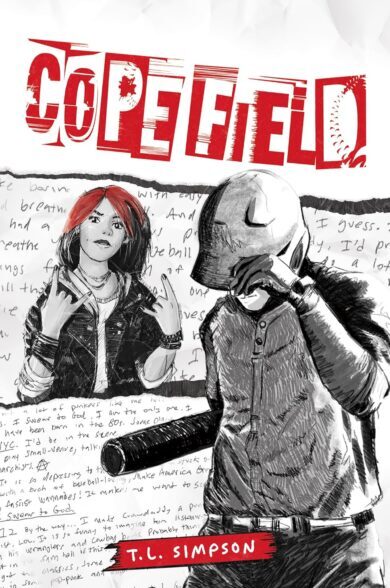Crawford “Craw” Cope has anger issues. Or so they say. When Craw is sentenced to community service for hitting his father in the head with a baseball bat, he accepts his punishment without objection, knowing he’s actually lucky. If he weren’t the son of a famous former baseball player, he’d probably have gotten it a lot worse. So, Craw keeps his mouth shut and takes what life gives him. Like always.
But when he arrives at community service, he meets Hannah Flores, a punk rock enthusiast trapped in the Ozarks with zero filter. As Craw navigates his own explosive home life, he learns more about hers. And as their friendship blossoms into something more, he begins to understand the importance of speaking his truth, even when doing so might destroy the only life he’s ever known.
Cope Field is intense, gritty and gripping – also devastatingly powerful and beautifully written. It’s a contemporary story set in Arkansas about baseball, family, anger management and abuse.
My fuse might be long, but it runs hot. And when I have had enough, I don’t have the means to stop myself from acting stupid.
It treats the reader to dialogue in the captivating lingo of poor rural Southerners. In other words, it has a refreshing and captivating voice, along with sparse prose to which boys especially will relate.
There is something about his eyes I hate. They bulge out too much. And they’re too wet and slimy looking. And the smile on his mouth don’t touch those eyes. Nothin’ in those grimy marbles but malevolence.
As a coming-of-age story it explores, super-perceptively, what it means to be a young man. It’s about a teen boy’s anguish over whether he deserves how his single father treats him and his younger brother, and the contrast with how the world sees their family.
Pops is tense. Like a loaded animal trap, right on the edge of snapping closed on some poor critter’s neck.
Pops tore his hat from his head, slammed it on the ground. He stomped it three times and started yelling. Slobber flying from his mouth like a rabid pit bull.
I can’t forget. God knows I have tried, but I cannot. Been two months and all this stuff been swirling around inside me like the contents of a toilet bowl.
It all unfolds in the first-person point of view of Crawford, whose love and concern for his younger brother is especially touching. But Crawford needs to decide if it’s worth living in denial in order to keep up a front, and what that covering up is doing to him. Then there’s the pain of how and why his mother disappeared, and the fascination with a teen girl who has to handle her own gritty homelife. Bottom line: Cope Field is about the need and struggle to redefine manhood and become a better person. (T.L. Simpson’s previous novel, Strong Like You, does the same with the equal talent.)
The lingo occasionally breaks up the tension with strands of humor:
Across the street, there is a small white farmhouse. Looks like it’s been there since before Abraham Lincoln was president with not a single person alive since then who gave a care about it.
The novel handles complicated emotions so deftly that it ranks as one of the best books I’ve read this year, and all in the fresh voice of a gutsy, relatively new novelist. As Kirkus Reviews’ Laura Simeon has said, “Young adult books… that unpack toxic masculinity in accessible and engaging ways that speak directly to boy readers are vanishingly rare.”
I do have words inside me. Raging around like wildfire. Burning up my insides. I wish I could siphon them out. Breathe fire like some kinda dragon on this entire room.
There’s goodness here. Underneath all the rough spots.
The writing is almost poetic, the raw scenes are relatable and the characters’ passion for baseball stitches it all together. The only criticism is a somewhat drawn-out ending, but one that is satisfying anyway.
In short, Cope Field is an impossible-to-put-down story, and a must-read for male readers of any demographic.
– Pam Withers


